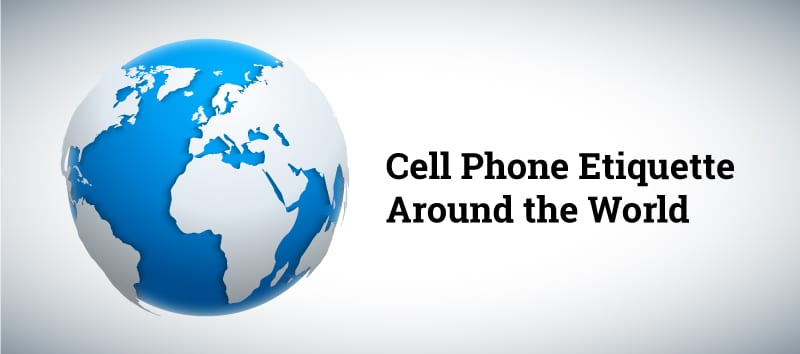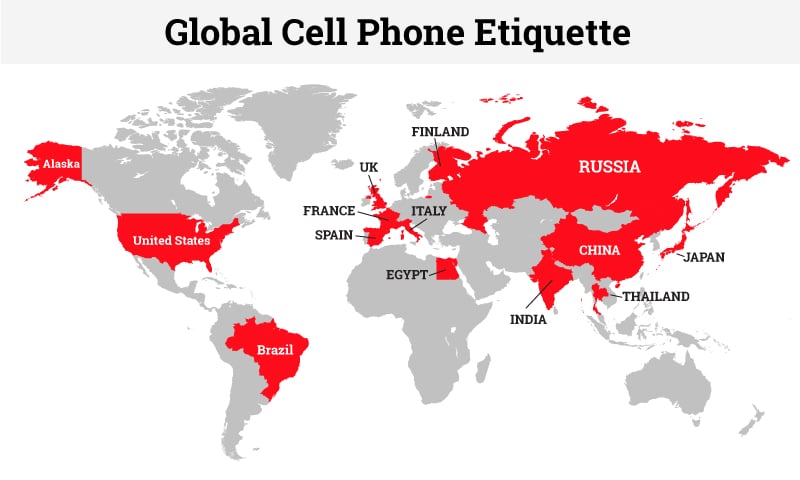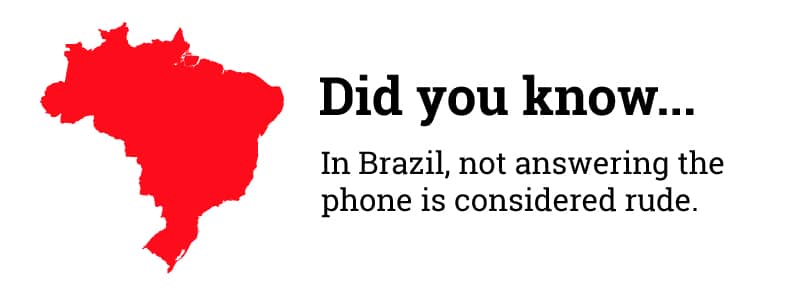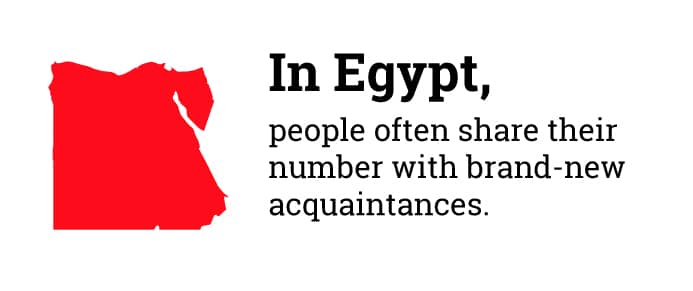Mobile Manners: Cell Phone Etiquette by Country

Cell phones are truly incredible devices. Never before have billions of people been so immediately reachable, so interconnected with one another. And yet, despite the ways in which they unify us, we all use our phones in wildly different ways and contexts.
In fact, there’s really no such thing as global cell phone etiquette. Each culture has its own take on what is and isn’t appropriate behavior. It’s not as simple as knowing how to say “Hello” in a new language.
Discovering how we differ from one another can be quite fascinating. Read on to learn how cell phone etiquette around the world matches up.

Jump to: United States | The United Kingdom | Brazil | France | Spain | Italy | Egypt | Finland | Russia | India | China | Japan | Thailand
The United States
The United States is where the phone was first invented and Hello — a word we previously used to attract attention — developed into a phone greeting. Saying Hello to answer a call would go on to become commonplace worldwide, as we’ll soon see. In the United States, an unfamiliar number may be greeted with Hello or a statement affirming the receiver’s own name, while the more casual Hi, Hey and What’s up? are reserved for friends and family.
There’s no real taboo on answering calls in public spaces, except in theaters, churches and the more formal restaurant settings. However, Americans do generally try to be aware and conscious of others when doing so. They keep the volume low and avoid any highly personal subject areas.
Business meetings are a no-go, except when emergencies are involved. And while the exact cutoff may vary slightly (often from around 9 p.m. to 10 p.m.), there exists a sort of unwritten rule not to bother others with a call at night.
The United Kingdom
British phone greetings are largely the same as American ones, with Hello and the like remaining quite common. And much like in the United States, there is a general sense that the people you’re physically with deserve more attention than those on the phone.
It’s considered poor form to interrupt a face-to-face conversation to answer a ringing cell or to start texting others. If you do answer a call, however, be prepared to devote your full attention to it. Eating during a call or showing any other signs of distraction comes off as rather rude to the person on the other end.
Brazil

Answering the phone in Brazil often starts with Alô, but be prepared for the caller to ask “Who is this?” or “Who is talking?” — even though they initiated the call! Brazilians love chatting on their cell phones, so brace yourself for a hearty conversation and a slew of goodbyes interwoven with fresh topics.
Not answering one’s phone at all is considered rude, and Brazilians will often excuse themselves from meetings, restaurants or theaters to do so. They would prefer not leaving it for voicemail.
One quirk that often surprises visitors to Brazil is the tendency for Brazilians to say “uhh … uhh …” in the background when listening to the other side of the conversation. Although this will take many aback the first couple of times it happens, it’s not meant to be a disrespectful interruption. In fact, it’s merely a way for the other speaker to show that they are still there, a useful indication in a country where the phone lines are notoriously unreliable.
France
A phone conversation in France typically begins with the standard greeting of Allô, although Salut is common as well. It has become trendy amongst the younger generations to string one or more greetings together, leading to constructions like Oui, Allô? Salut!
By and large, the French have a take on cell phone etiquette that mostly aligns with that of Americans. They are generally conscious of the impact their conversations have on others, and it’s considered rude to speak too loudly into one’s phone in public.
Using a cell phone on public transit or in restaurants is often strongly avoided for the sake of politeness. If a call must be answered, the French will be sure to tone down their voices.
Spain
Phone use in public is the furthest thing from taboo in Spain, a country where private discussions in communal spaces has long been commonplace. People here are willing and eager to discuss personal matters on public transit or in crowded plazas. In restaurants, concerts and even business meetings, the Spanish can be found happily fielding calls with a warm Bueno or texting under the table.
In fact, Spanish folks may be a bit put-off by having their calls ignored. Having a cell phone comes with the expectation of being available to friends, family and colleagues.
Voicemail is fairly uncommon in this country, with the assumption being that a missed attempt will be returned by the recipient either way. A missed call is, in itself, a sort of message: namely, “Call me back!”
Italy
The standard phone greeting in Italy is Pronto!, which can mean either “ready” or “promptly” depending on the context. It’s a sign of open ears and an invitation to relay your message.
Historically, Italians have a reputation for being chatty, and this has carried over into the modern world, where ownership of cell phones (or “telefonini”) is widespread and its usage can be very pervasive. Combine this with the culture’s high emphasis on familial connections, and it’s no wonder that so many appear glued to their devices throughout the day.
Much like the Spanish, Italians are not shy about answering calls in public (even in sales meetings and other somewhat formal settings), and they rarely use voicemail. If you do happen to leave a voice message for an Italian, keep it short and straightforward. A voicemail that comes off as rambling shows little regard for the recipient’s time and is considered rude.
Egypt

When you pick up the phone in Egypt with a warm Alo, don’t expect to have a quick and straightforward conversation. It’s customary here to begin by exchanging pleasantries back and forth — sometimes for as long as five minutes — before actually getting to the point of the call.
Questions regarding each participant’s personal news are all part of the ritual, and both speakers will frequently thank God for their good health and status. Once the call does begin in earnest, it’s considered quite rude not to give it your full attention.
Cell phones are immensely popular here, and people aren’t shy about sharing their number with brand-new acquaintances. Taking down someone’s number, even if just to be polite, comes with the expectation that you’ll answer their calls or at least give them a ring back. If it all seems overwhelming, remember that this is just a modern take on traditional Egyptian hospitality.
Finland
Few nations have been as transformed by cell phone usage as Finland. While many visitors once left this country with the impression that Finns were highly introverted and reserved, today’s tourists will see a land of hyper-communicative people, living and embracing the future.
The cell craze isn’t limited to text messages or other forms of silent communication. The persistent clamor of ringtones echoes across public spaces, broken by the occasional Haloo! of an answered call. It shows just how eager Finns have become to exchange words with their friends and family members, even when far apart.
Finland is the home of mobile giant Nokia — the nation’s largest company — and was the first country in which cell phones outnumbered landlines. As in many other countries, the local sense of cell phone etiquette discourages Finns from using their mobile devices when it would be disruptive or dangerous.
Meeting rooms, hospitals, churches and airplanes are considered wildly inappropriate settings. While using cell phones in restaurants is considered somewhat rude, it does happen here and there.
Russia
Cell phones are quite popular amongst young Russians who see these devices as a symbol of individual freedom and privilege not to be taken for granted. For much the same reason, customized ringtones and ringback tones are big here. But phone etiquette in Russia might seem rather foreign to many from English-speaking countries.
While some in Russia may answer their phone with a hearty Allo!, it’s not entirely uncommon to instead hear “Who is this?” or even nothing at all, particularly when receiving a call from an unrecognized number. Don’t mistake this as a sign of rudeness.
The former Soviet Union’s legacy of frequent line tapping has not been forgotten. As a result, many Russians, especially those of older generations, are a bit wary of speaking on the phone even today. With this somewhat recent change in phone culture, as well as the rather unreliable status of many local cellular networks, calls in Russia are generally kept rather short and to the point. Voicemail is not often used or checked.
Taking or even receiving a call in restaurants or during shows is frowned upon, but it does happen with some regularity. The problem is so pervasive that some theaters have even invested in high-tech equipment to block cell signals. Phone use in business meetings is considerably more tolerated, although individuals will try not to be too disruptive when attending to a call.
India
India is a land of many languages, and there is no standard phone greeting across the entire country. While some may answer their calls with an informal Raam raam and others with Namaste or even the English-inspired Hallo!, the sense of cell etiquette is a bit more universal.
For some Western sensibilities, “etiquette” might seem an odd word to use when describing cell phone use in India. This is because there is far more tolerance for what some might view as an infringement on personal space or personal time.
Indians are known to regularly pick up the phone in libraries and movie theaters, and even at speeches and other highly official functions. It’s also not unusual to place calls well into the nighttime hours, for any reason at all. India’s culture values tolerance and a sense of communalism. There simply are not many cell habits that would come across as rude.
Particularly interesting is the culture of “flashing” that has developed in some regions of India. In this country where rates can be high and the income gap between high and low earners can be quite substantial, some individuals have taken up the habit of making split-second calls, immediately hanging up before the receiver has a chance to answer. This serves as a notice to the receiving party and an invitation to call back, which causes them to foot the tab for the call.
China

In China, one should never be surprised when a face-to-face conversation is interrupted by the other person answering their cell phone (or “shou-ji”, literally meaning “hand machine”). It’s actually hard to blame them for doing so. If a placed call isn’t picked up, the Chinese will tend to phone back continuously until they get a response, sometimes letting each attempt ring 10 or more times. Answering machines and voicemail simply aren’t in widespread use here.
It’s not only in casual environments that this happens, either. Fancy restaurants and even business meetings are not seen as inappropriate settings in which to take a call. The forwardness of how the Chinese will answer their cell depends on their own importance in that specific situation. Anything goes for an executive, while a simple salesman might hunch down and whisper into the phone instead, trying not to be a nuisance.
Japan
Many of us in English-speaking countries begin our phone calls much like we would speak in person, with a Hello, Hey or perhaps Good morning. But in Japan, there is a special greeting that is only used at the beginning of phone calls: “Moshi moshi!”
The Japanese culture places a very high emphasis on politeness and social harmony, and that’s reflected in their approach to cell phones. Train announcements remind commuters to switch their mobile devices to vibrate or silent mode, and public spaces often feature signs politely requesting that phone use be avoided.
Taking a call in a restaurant or cafe would be considered very disruptive. Even silent use of cell phones in movie theaters, where screen light could annoy other patrons, is a major faux pas. And because Japan is such a densely populated country, texting and emailing — which impose less on nearby people — have emerged as far more popular than voice calls.
Thailand
There aren’t many situations in Thailand when it’s inappropriate to answer your phone. Thais have been known to do so in the middle of face-to-face conversations, during business meetings and even at job interviews. In fact, the expectation that the person you’re calling will pick up is so strong that the dialing Thai may hang on the line continuously, waiting ring after ring until they hear that gentle click and friendly Haaloh.
This may be, in part, due to the strong emphasis Thai culture places on family. To ignore a call from one’s parents, spouse or siblings would be disrespectful at best and dangerous at worst. While some visitors to this nation might be offended at having their conversation interrupted by a call, just remember that it’s nothing personal!
Evolving Cell Phone Etiquette Around the World
Whether you’re planning a globetrotting expedition or are simply a curious reader on your own mobile device, you should now have a better sense of global cell phone etiquette. What does the future hold for communication? Only time will tell.
